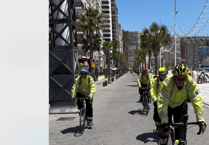SWIMMERS set to enjoy Devon’s waterways this summer are being urged to ‘Respect the Water’ as part of a safety campaign.
The National Water Safety Forum (NWSF) is reminding everyone to enjoy the water safely by being aware of the risks, and by knowing how to help themselves and others in an emergency.
May was the month with most accidental water related fatalities, with 28 lives tragically lost.
As such, NWSF are urging the public to ‘Respect the Water’ as the spring weather continues to be warm this year.
Although air temperatures are rising, open water temperatures remain dangerously cold – many inland waters such as lakes and rivers remain below 16°C all year round, which is when water is considered hazardous for cold water shock.
Cold water shock is the body’s response to sudden immersion in cold water, leading to an involuntary gasp, rapid breathing and loss of swimming ability.
This can result in drowning, especially if the person falls into the water unexpectedly.
Chairman of the NWSF and leading expert in water safety and cold water shock, Professor Mike Tipton, said: ‘Each one of these fatalities represents a tragedy and the loss of many years of life, all those involved have my deepest condolences.
‘The National Water Safety Forum will continue to work tirelessly to reduce drownings in the UK through data-driven education, interventions, communication and campaigns.
‘Because it is clear that drowning can occur anywhere and to anyone, I urge the general public to visit the National Water Safety Forum’s Respect the Water website to learn about water safety, and how to prevent themselves and others from drowning.
‘A small amount of time devoted to drowning prevention could save many lives’.
The 2024 Water Incident Database (WAID), which is maintained by the NWSF, showed that inland waterways, such as rivers, canals, lakes, reservoirs and quarries, continue to be the leading locations for accidental drowning, accounting for 61 percent of deaths.
It also showed that males continue to be over-represented, with 84 percent of accidental fatalities.
If you find yourself in trouble in the water, float to live:
- Tilt your head back with your ears submerged
- Relax and try to breathe normally
- Move your hands and legs to help you stay afloat
- It’s OK if your legs sink, we all float differently
- Once your breathing is under control, call for help or swim to safety.
If you see someone else in trouble in the water this summer, remember Call, Tell, Throw:
- Call 999 to get help
- Tell the struggling person to float on their back
- Throw them something that floats, such as a life ring, inflatable toy, or bottle.





Comments
This article has no comments yet. Be the first to leave a comment.